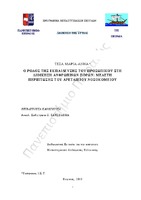Ο ρόλος της εκπαίδευσης του προσωπικού στη διοίκηση ανθρωπίνων πόρων: μελέτη περίπτωσης του Αρεταίειου Νοσοκομείου
The role of employee education in human resource management: case study of Aretaieio Hospital

Προβολή/
Θεματική επικεφαλίδα
Νοσοκομεία -- Διοίκηση προσωπικού ; Hospital -- Personnel administration ; Νοσοκομεία -- Διοίκηση και οργάνωση ; Hospital Administration ; Health services administration ; Διοίκηση υπηρεσιών υγείαςΠερίληψη
Είναι πλέον γενικώς αποδεκτό πως η ανταγωνιστικότητα της οικονομίας οικοδομείται σε στελέχη με εξειδικευμένη γνώση και γενική καλλιέργεια που συνεχώς εμπλουτίζεται και επικαιροποιείται στη σημερινή κοινωνία της γνώσης και της πληροφορίας. Η εκπαίδευση και εξειδίκευση των επαγγελματιών υγείας αποτελεί μέρος της ορθολογικής κατανομής και αξιοποίησης αυτών με στόχο την αποδοτικότερη λειτουργία των υπηρεσιών υγείας. Η εργασία αυτή σκοπό έχει να διερευνήσει τις εκπαιδευτικές ανάγκες των εργαζομένων (διοικητικό και νοσηλευτικό/μαιευτικό προσωπικό) στο δημόσιο πανεπιστημιακό Αρεταίειο νοσοκομείο, την επιθυμία τους για μετεκπαίδευση, το ποσοστό αυτών που έχουν μετεκπαιδευτεί, καθώς και τις αντιλήψεις τους για τα κίνητρα, που θα μπορούσε να προσφέρει η Υπηρεσία τους για την περαιτέρω επιμόρφωση τους. Στο πρώτο μέρος γίνεται μια θεωρητική προσέγγιση του θέματος με έμφαση στην αξία της συνεχιζόμενης εκπαίδευσης και της αναγκαιότητας ύπαρξής της, καθώς και στα υπάρχοντα εκπαιδευτικά προγράμματα και μεθόδους των δημοσίων φορέων. Στο δεύτερο μέρος, το οποίο περιλαμβάνει το εμπειρικό τμήμα της εργασίας, γίνεται ανάλυση, ποσοστοποίηση και σύγκριση των αποτελεσμάτων των ερωτηματολογίων. Τέλος, στο τρίτο μέρος διατυπώνονται τα συμπεράσματα της έρευνας και προτάσεις για την κάλυψη των εκπαιδευτικών αναγκών του προσωπικού στο Αρεταίειο νοσοκομείο. Τα αποτελέσματα της έρευνας έδειξαν ότι το διοικητικό και νοσηλευτικό/μαιευτικό προσωπικό επιθυμούν να μετεκπαιδευτούν και αναγνωρίζουν την αξία της συνεχιζόμενης επαγγελματικής εκπαίδευσης. Τα πιο δημοφιλή θέματα για περαιτέρω εκπαίδευση είναι επαγγελματικής φύσεως (ειδικότητας), διοικητικά και πληροφορικής, καθόσον μόνο το 1/3 των εργαζομένων έχει μετεκπαιδευτεί. Οι εργαζόμενοι αναγνωρίζουν ως πρωτεύοντα τα προσωπικά οφέλη σε σχέση με τα επαγγελματικά, όσον αφορά στη συνεχιζόμενη εκπαίδευση, ενώ θεωρούν ισχυρότερα τα κίνητρα της επαγγελματικής καταξίωσης από εκείνα της χορήγησης εκπαιδευτικής άδειας.


